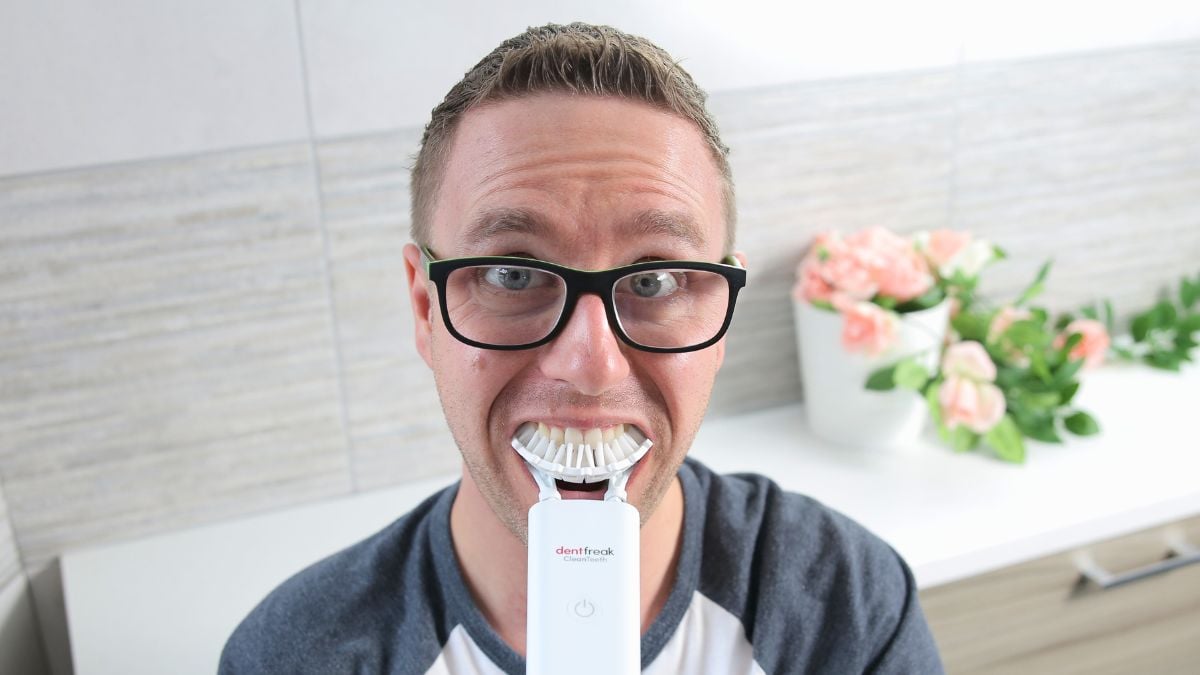
Disclaimer: I am a dentist gathering knowledge for others. Whilst every effort has been made to use inclusive language, if there is something you think should be worded differently, please get in contact so I can update my knowledge and the article.
How can physical and mental impairments impact dental health?
People with health conditions or impairments can have a range of challenges with their oral health.
This depends greatly on the condition or impairment that they have.
For example, people with a cognitive disorder or learning disability might find it harder to understand the need for mouth care. Research by Public Health England revealed that people with learning disabilities experience higher levels of untreated dental diseases and poorer access to dental services.
People with physical disabilities can have difficulties in carrying out personal mouth care. It can be difficult in this case to control hand or arm movements and achieve a good clean. They may even have issues with accessing an area to perform their own dental care.
Medical conditions can have a direct impact on oral health. For example, medications can cause dry mouth.
Regardless of the cause of the difficulty, there are consequences of poor oral health.
Poor oral health can lead to pain and discomfort. It can also have a major impact on quality of life.
Dental care for people with autism
Autism is a developmental condition. It is worth mentioning in itself because of how common it is.
In the UK, it is estimated that 1 in 100 people have been diagnosed with an autism spectrum disorder (ASD).
People with ASD can experience difficulties with communication so are unable to verbalise about their dental needs.
They may also have cognitive impairments. They can have a lack of understanding as to why oral health is important.
Often, people with ASD have sensory differences. They can experience hypersensitivity, which can make oral health care a challenge because the mouth is particularly sensitive. Alternatively, they may be under-sensitive which can pose it’s own challenges for oral care.
Some small adjustments to their oral care routine may have a positive impact on their overall health. As every person has different triggers it is difficult to be able to give specific advice. Some dental advice for people with autism include:
- Make information accessible. It should be easy to follow. Using apps and pictures to create good self care habits. See the section below on technology and apps.
- Select a toothbrush that does not cause discomfort. Different people have different sensory triggers. Depending on the person’s individual needs this could mean using or avoiding an electric toothbrush. The material used may also be important, for example selecting silicone over traditional brushes.
- Limit the amount of time spent on brushing. The amount of time that the person is able to cooperate for can be limited. This may not be the full two minutes recommended for brushing. Being able to clean multiple surfaces at the same time may help reduce this time. A triple headed brush, for example, could help ensure all tooth surfaces are cleaned in less time.
- Avoid unpleasant tastes. People with ASD can be particularly sensitive to tastes and sensations of toothpaste. Alternative toothpastes listed below include flavour free and non-foaming options.
- Consider the use of headphones during oral care practices. The use of headphones can have a number of positive impacts. They can reduce the noise during cleaning. They could also be used to play music or sounds that are distracting and so enable brushing to be carried out.
Further advice for dental care for people with ASD can be found in this booklet “Advice for parents of children with autism” from the British Society of Paediatric Dentistry.
Further advice for dental care for people with ASD can be found in this Dental Toolkit by the charity Autism Speaks.
Prevention of dental problems for people with disabilities
In addition to difficulty cleaning their teeth and increased risk of some dental conditions, people with disabilities often experience barriers to accessing care. This could range from being unable to physically get to a dental office, to experiencing discomfort during examination from a dentist.
All things considered, prevention at home is important for people with disabilities (as it is for non-disabled people too).
The basic advice is based on the Delivering Better Oral Health Toolkit from Public Health England.
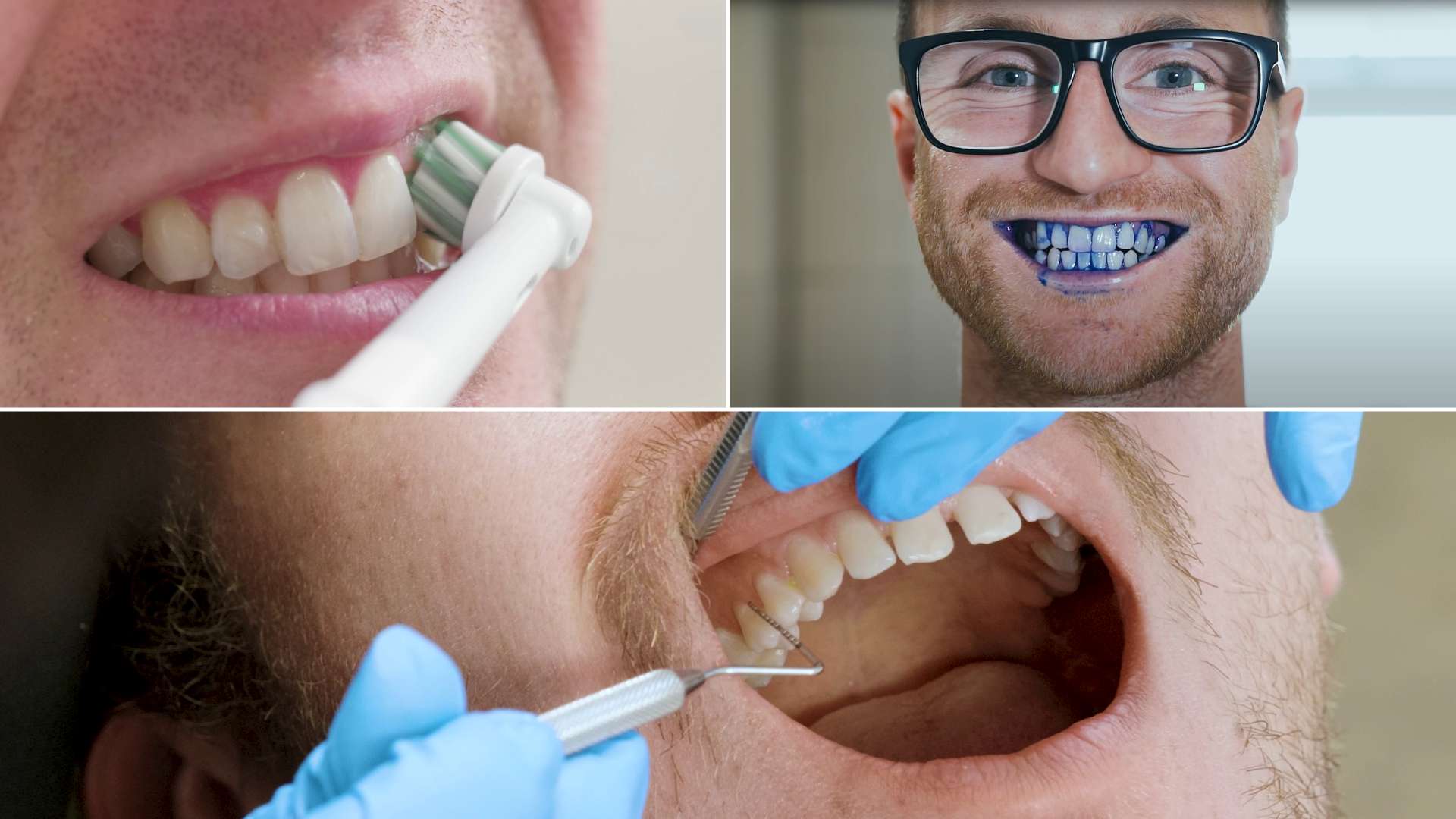
Cleaning the teeth
There is basic cleaning advice for the removal of plaque from the teeth.
- Brush twice a day, for two minutes each time.
- Use a fluoridated toothpaste.
- Spit after brushing, do not rinse.
- If using a mouthwash, do so at a different time to brushing.
- Clean between the teeth (interdental cleaning) daily.
Obviously, not all of these will be possible for every body. But specialist tools and alternatives are available that could help overcome some barriers to oral hygiene.
Plaque is the soft white build-up on your teeth over the course of the day. It contains food debris, bacteria, and waste from bacteria. It directly causes dental decay and gum disease.
Physical removal of plaque, whatever form it takes is incredibly important. This removes the bacteria that causes dental diseases. Secondly, if you don’t remove plaque pastes or mouthwashes cannot access the tooth surface.
Plaque disclosing tablets can encourage cleaning. They stain plaque on the teeth. This can improve technique by showing which areas are being missed.
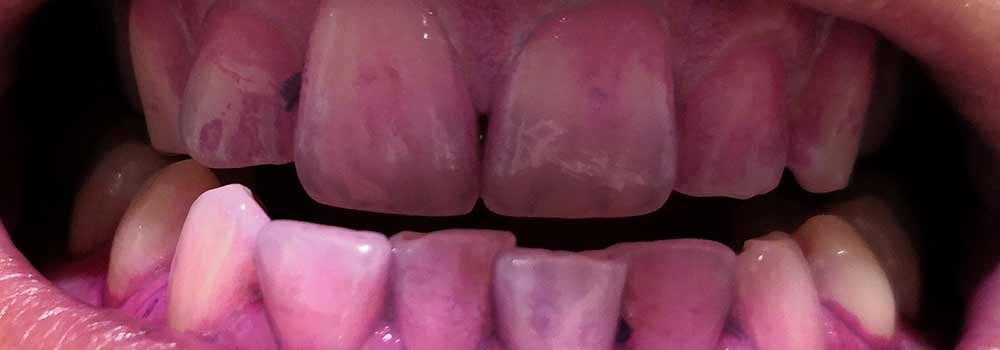
Reducing sugar intake
There are also some important messages relating to diet. Food and drink can impact the teeth as sugars increased risk of decay and acids cause tooth erosion.
- Use sugar alternatives in drinks and when adding to food.
- Opt for sugar free drinks.
- Keep sugar containing food and drinks to meal times.
Medications
Many medications are linked to dry mouth. Dry mouth increases the risk of dental decay. It can also feel uncomfortable. This can be discussed with a dentist or doctor. It may be possible to change medications to lessen the impact of a dry mouth.
Where possible, request sugar free options of medications (especially liquid form) to reduce the risk of dental decay. If this isn’t possible, rinse well with water or a fluoride containing mouthwash after taking the medicine.
Toothbrushes for people with disabilities
For a variety of reasons, some people with disabilities or impairments may be unable to use a regular toothbrush.
There are some alternative style toothbrushes available. These may have an altered handle, which can be a good toothbrush option for arthritis.
Other adaptive toothbrushes work on cleaning multiple tooth surfaces at the same time, such as triple headed toothbrushes.
Electric toothbrushes
Electric toothbrushes are more effective at cleaning the teeth than manual toothbrushes. They should be used when possible. They also tend to have a small head which is appropriate for most people.
You can see our guide to the Best Electric Toothbrushes to find one that meets your needs.
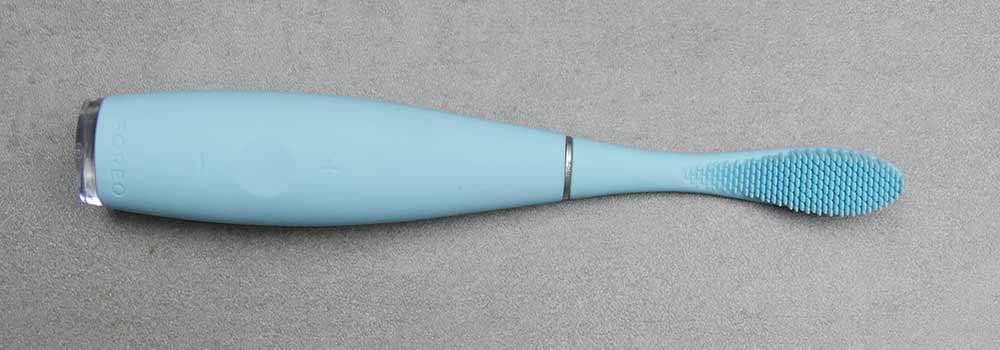
One special consideration is the Foreo Issa 2. This electric toothbrush has a silicone head which might be better tolerated than traditional bristles. It is also less likely to fray if bitten down on. This toothbrush also has a particularly wide handle which is easier to hold compared to some traditional brands.

The 30 Second Smile is a rechargeable toothbrush that we have reviewed and been impressed by. This is a powered version of a triple headed toothbrush. The special toothbrush heads give maximum coverage of the tooth. For some people, this can be much easier than following the traditional technique. It also means that you can clean all your teeth within 30 seconds.
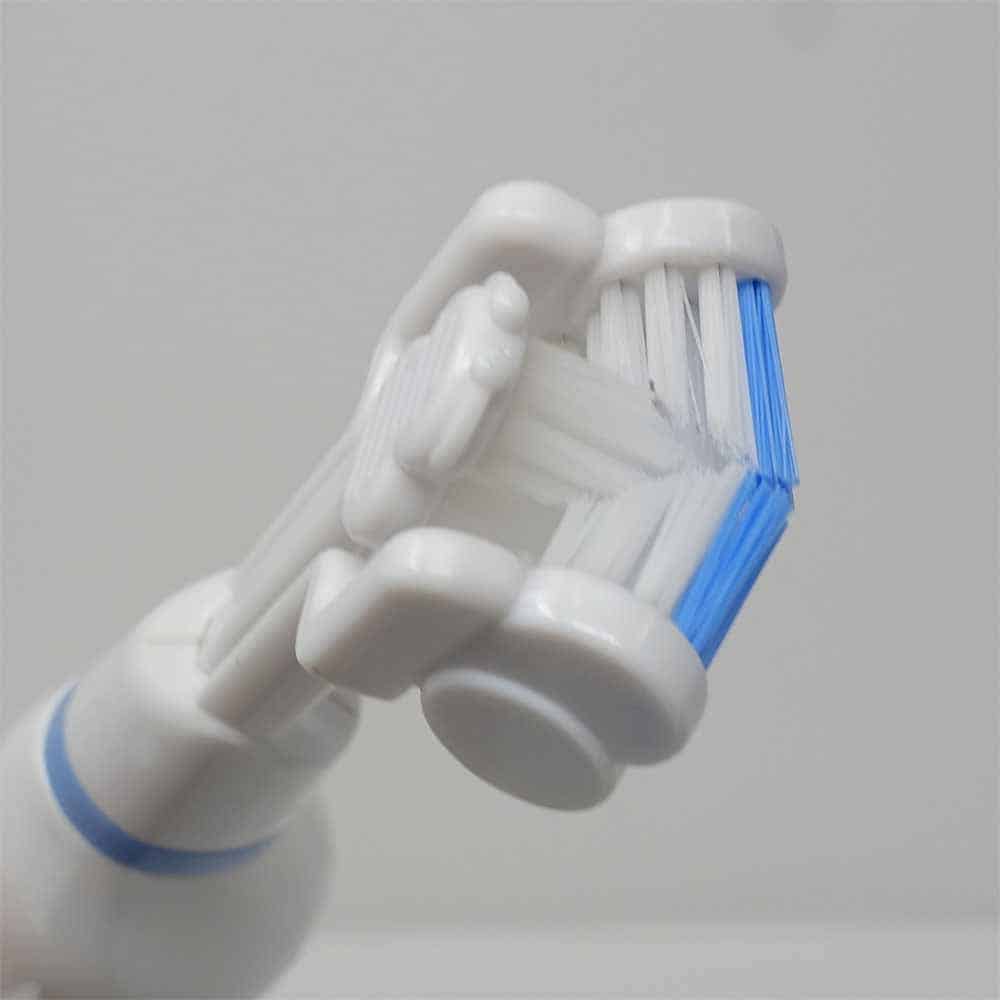
Triple Bristle (view on Amazon) has also been tested here at Electric Teeth. This is another powered toothbrush with a head that covers three tooth surfaces at the same time. Unlike the 30 Second Smile, it only does one arch at the same time. But overall, it does reduce the time taken to clean whilst also giving a more thorough clean than some other options.
Electric toothbrushes with suction
For some people with disabilities, swallowing may be restricted. This can be a challenge when brushing the teeth.
It is possible to get toothbrushes which have in-built suction to remove saliva and toothpaste from the mouth whilst cleaning.
These are a new invention. There are not many models available. The toothbrushes which are available, such as the G100, are very expensive (US$ 349!). Hopefully these will become more readily available in the future.
Finger brushes
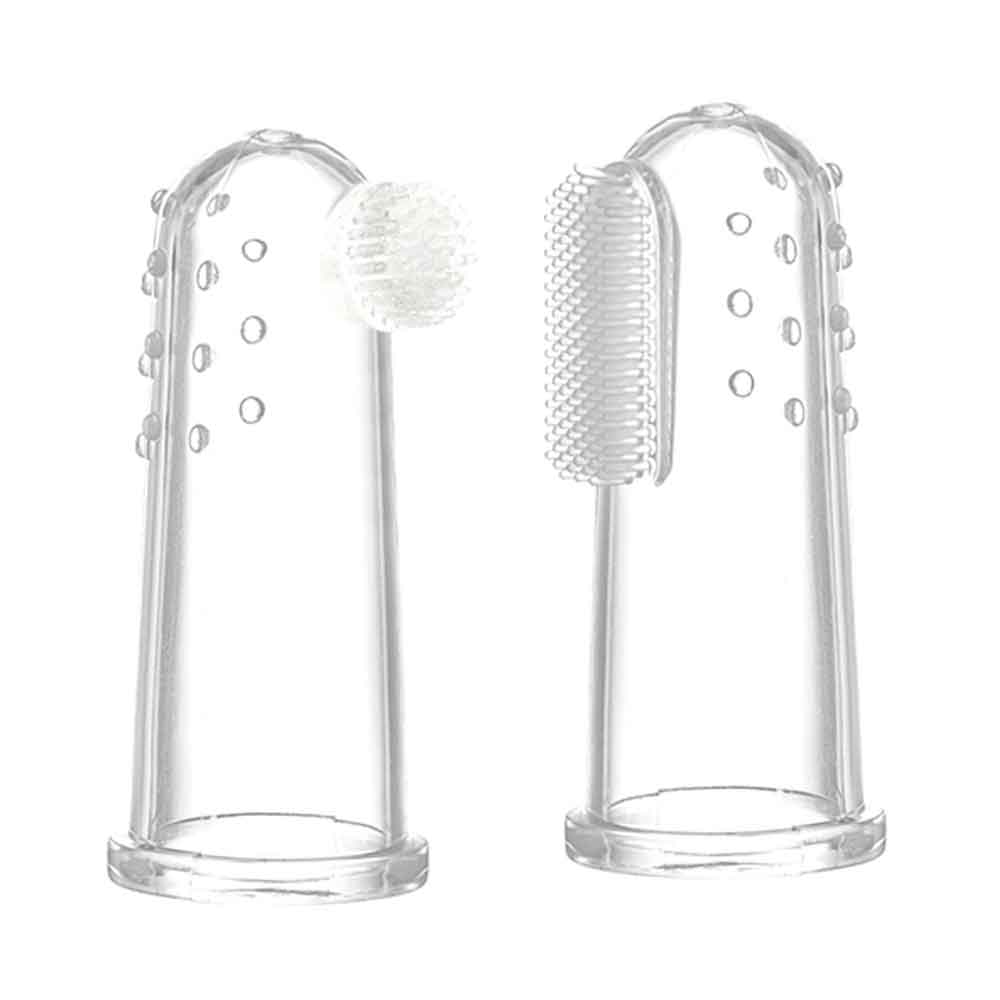
These are a small thimble-like device. They are usually made of silicone and slip over the end of the finger.
Finger brushes are not the most effective for removal of plaque. However, these small devices may be the only option for some people. They are better than no cleaning at all.
They can easily be found online.
Some stores may have these available as an option for brushing babies’ teeth.
Manual toothbrush
Where an electric toothbrush isn’t tolerated, a manual toothbrush can be used. It should have a medium to small sized head, with medium to soft bristles.
Mouthpiece (hands free) toothbrushes
Mouthpiece brushes aren’t something I would usually recommend (and you can find out why here).
Whilst these hands-free toothbrushes seem tempting, they often are not very good at cleaning.
However, where other brushes aren’t tolerated, or are too difficult to use, this is still an option. They brush all the teeth at the same time. This means the toothbrush doesn’t need to be moved around the mouth. The process is a lot quicker too.
The Y Brush is the best mouthpiece brush reviewed here at Electric Teeth. This could be an option if other brushes aren't possible.
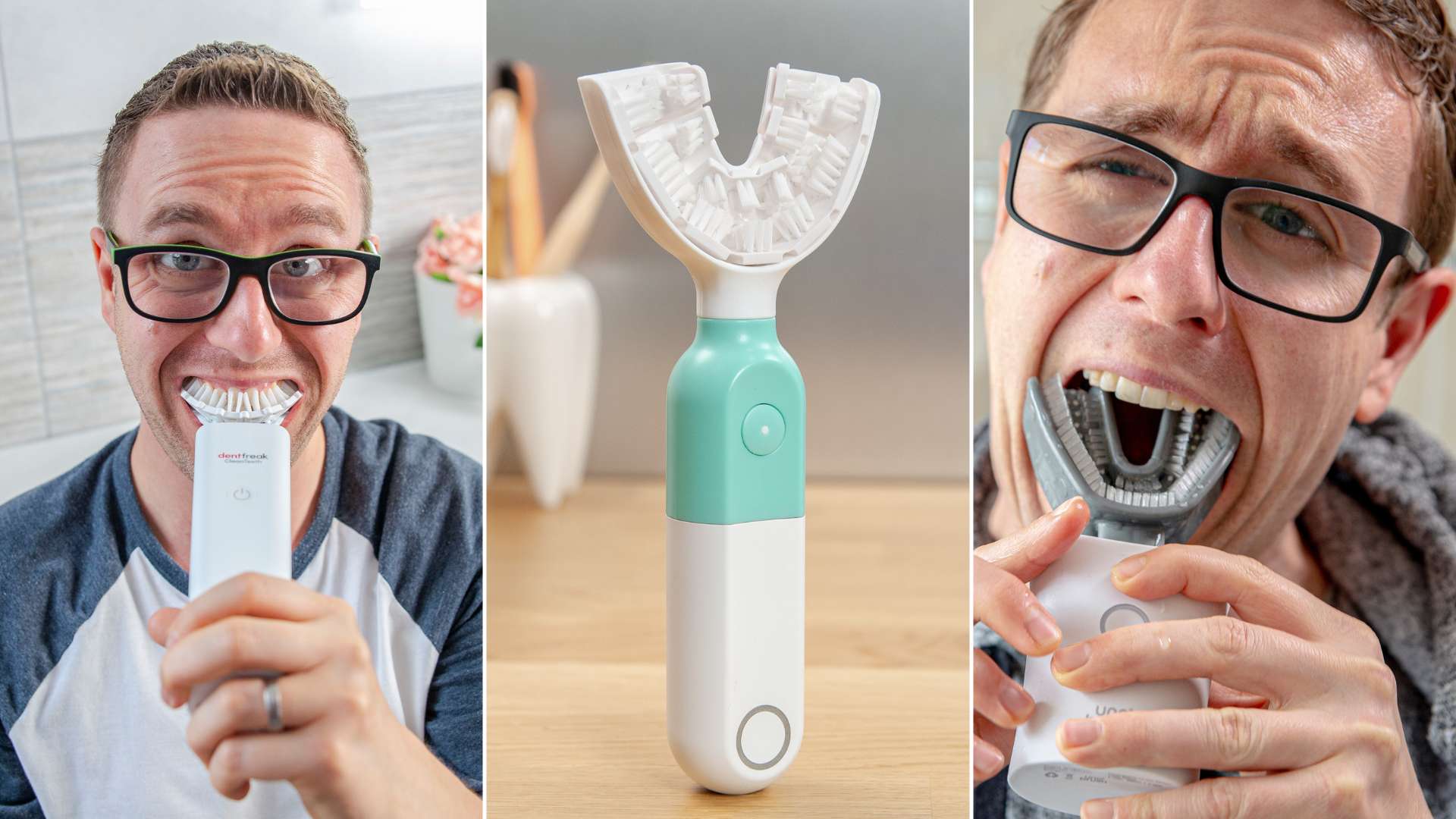
You can also watch our review of Blizzident in the video below. This is a silicone based sponge which can be chewed on to clean all the teeth at the same time. Whilst this may not necessarily clean as well as a regular toothbrush, it could be an option for those who otherwise would not clean. In our experience, it does seem like it cleans better than the mouthpiece brushes we have tested.
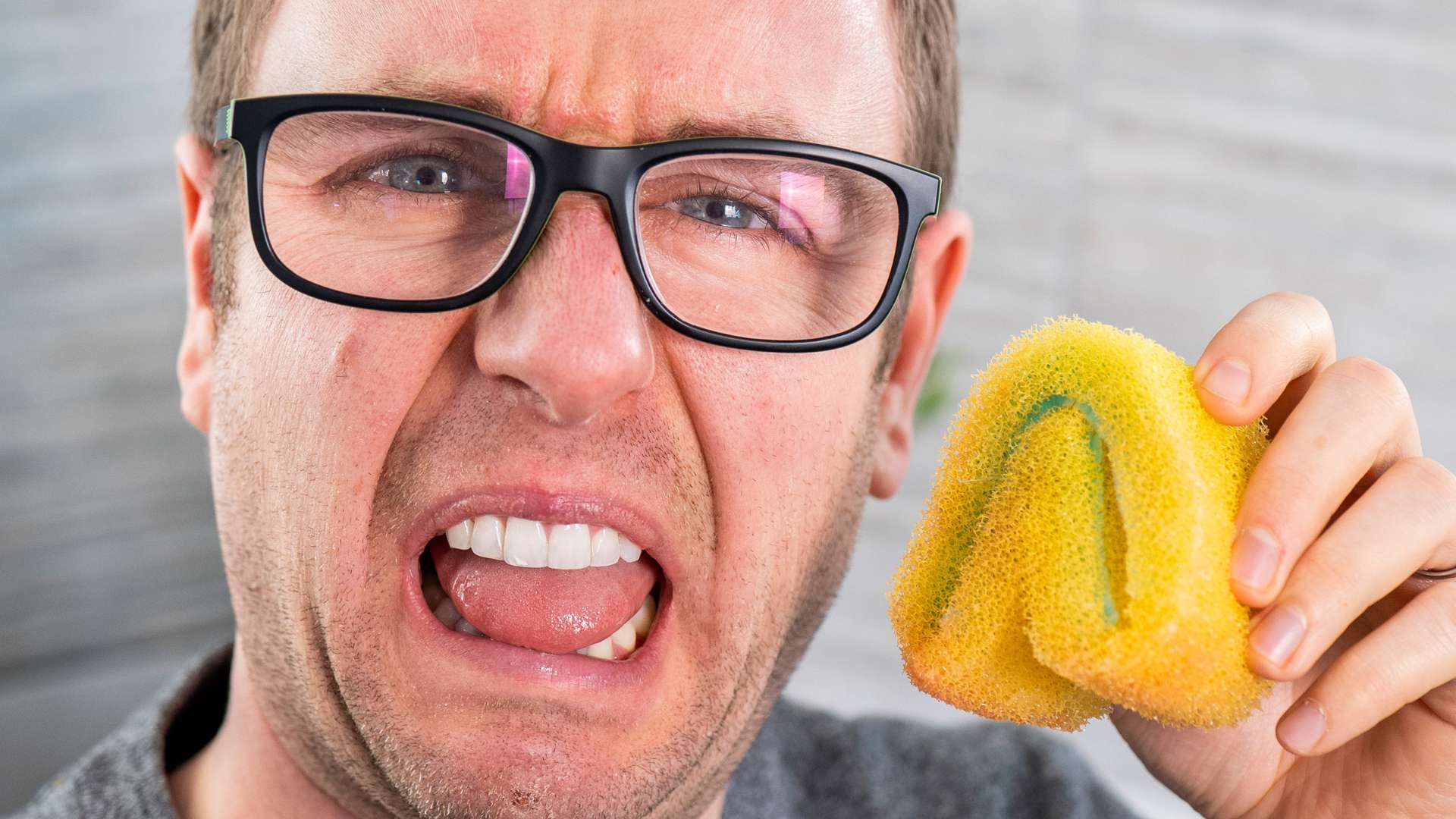
Another type of hands free toothbrush is the Fuzzy Brush. This chewable brush is made of an elastic material. You just put it in your mouth and chew. There is some evidence to support that they do remove plaque. It also contains xylitol, which has anticavity effects. It doesn’t foam up, which is ideal for those who have difficulties swallowing. Although I would urge caution due to the potential for choking on it. Whilst not as good as a regular brush, it is better than nothing.
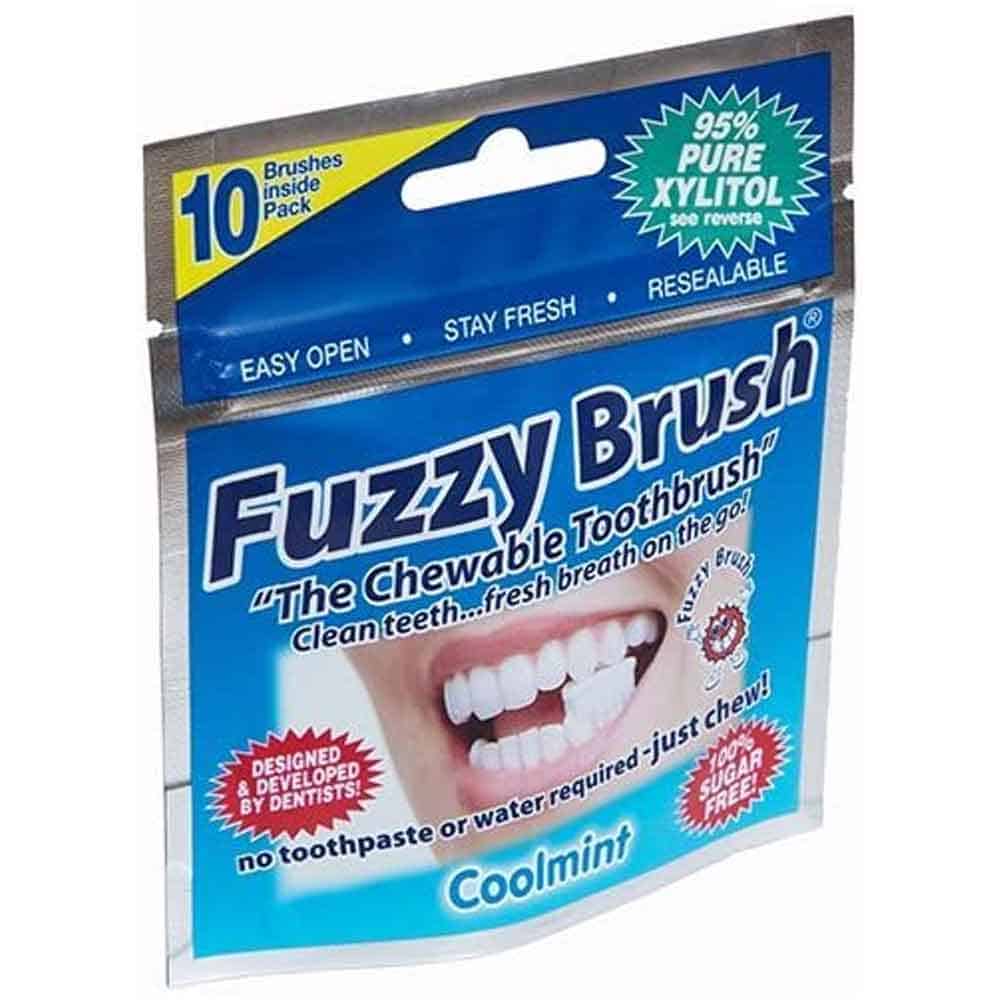
Triple headed toothbrushes
These manual toothbrushes have a different shape to the bristles. These cover a larger surface area. They are able to reach the area where the tooth meets the gum.
The shape of the bristles makes the brushing technique easier. There is no need for complicated movements to remove all plaque.
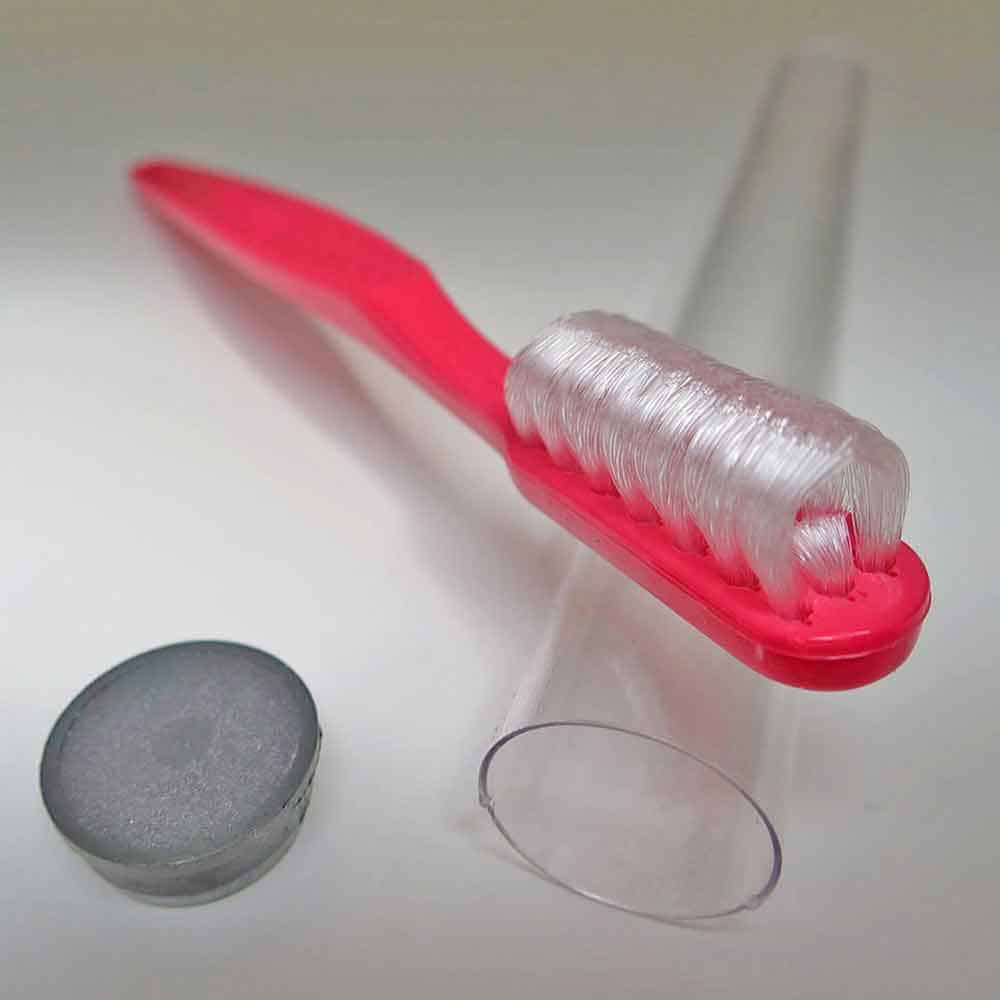
Overall, more surfaces can be cleaned in a quicker time. This could be important if it is only possible to clean the teeth for a short amount of time, regardless of the reason.
Some popular brands and models include:
- Collis Curve Toothbrush (view on Amazon)
- Dr Barmans Triple Head Superbrush (view on Amazon)
- Triple Bristle (view on Amazon)
- 30 Second Smile
Although there is very little scientific research comparing the different brushes, I expect powered versions will give a better clean than a manual brush.
Toothbrushes with bigger handles
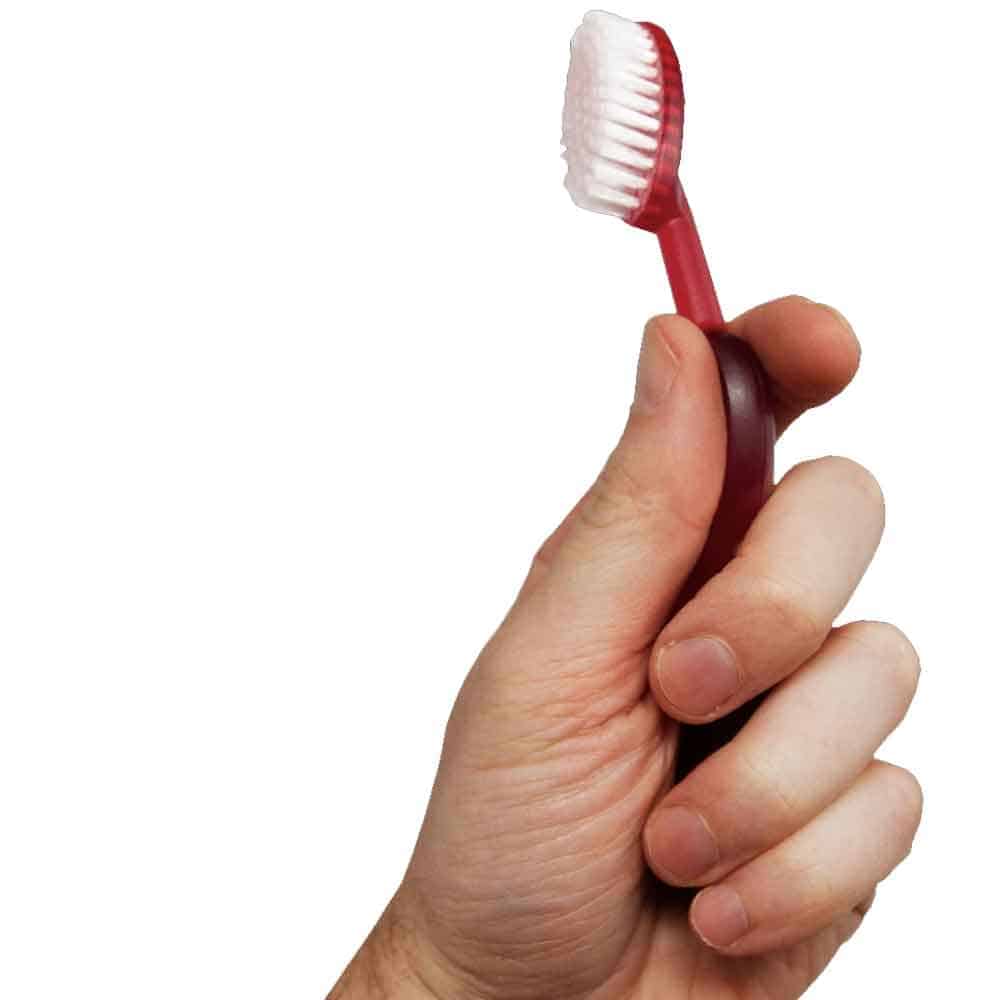
People with disabilities can have restricted hand mobility or grip. If that is the case, then a specially designed toothbrush with a larger handle can be a good option.
Children’s toothbrushes and baby toothbrushes may also be a suitable option. These are typically designed as a toothbrush to use when you have less grip. The handles are normally larger and softer, making them easier to use if you have problems with your hands.
As a brand, Radius do a range of toothbrushes with sizable handles. For example, you could check out Radius Big Brush. This toothbrush has a large handle with an easy grip design, and even comes in a left handed and a right handed version.


Toothbrush handle adapters
Many people with disabilities are able to use a regular toothbrush but are unable to hold it. In this case, special handles can be added to a regular toothbrush.
Specialist handles
Foam grip handles make it easier to hold toothbrushes. They are an affordable option, and are easy to place and remove.
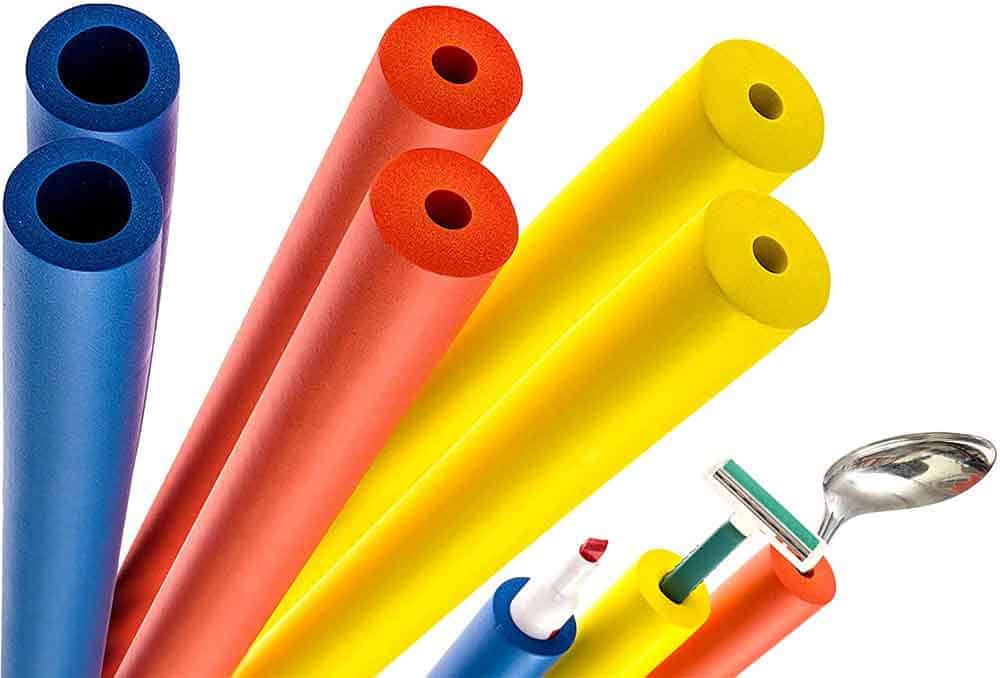
Universal cuffs or adaptive aids can help with grip on toothbrushes, but can also be used for other items such as cutlery.


DIY toothbrush handles
Some adaptive aids can be difficult to source. Some are also expensive to buy.
There are ways to adapt the grip at home:
- Use velcro to create a strap.
- Use a sponge to increase the width of a handle (cut a hole to slide the brush through the middle).
- Use a wooden spoon or ruler to increase the length of a handle.
- Use a tennis ball with a hole in the middle to increase the width of a handle.
- Slide the toothbrush into a bicycle grip.
Alternatively, a dentist or occupational therapist may be able to make a moulded handle using impression materials.
Flossing (interdental cleaning) for people with disabilities
Cleaning between the teeth is important. Brushing does not remove bacteria from the whole tooth surface.
Normally, people only think of flossing as an option for interdental cleaning. This can be especially challenging for people with a physical disability or with mobility problems.
Fortunately there are alternatives to flossing. And there are some tools which can make this task easier.
Some things to consider as an alternative to floss if you have difficulties with hand mobility:
- Use floss holders and floss tools. These have handles. This means you do not need to twist floss around the fingers and put your fingers in your mouth.
- Interdental brushes are much easier to use. They actually clean better than floss too. The small brush can be bent to reach between the back teeth. Or you can opt for brushes with longer handles.
- Water flossers require minimal hand dexterity. They are easy to use and some evidence shows that they have a better effect than floss.
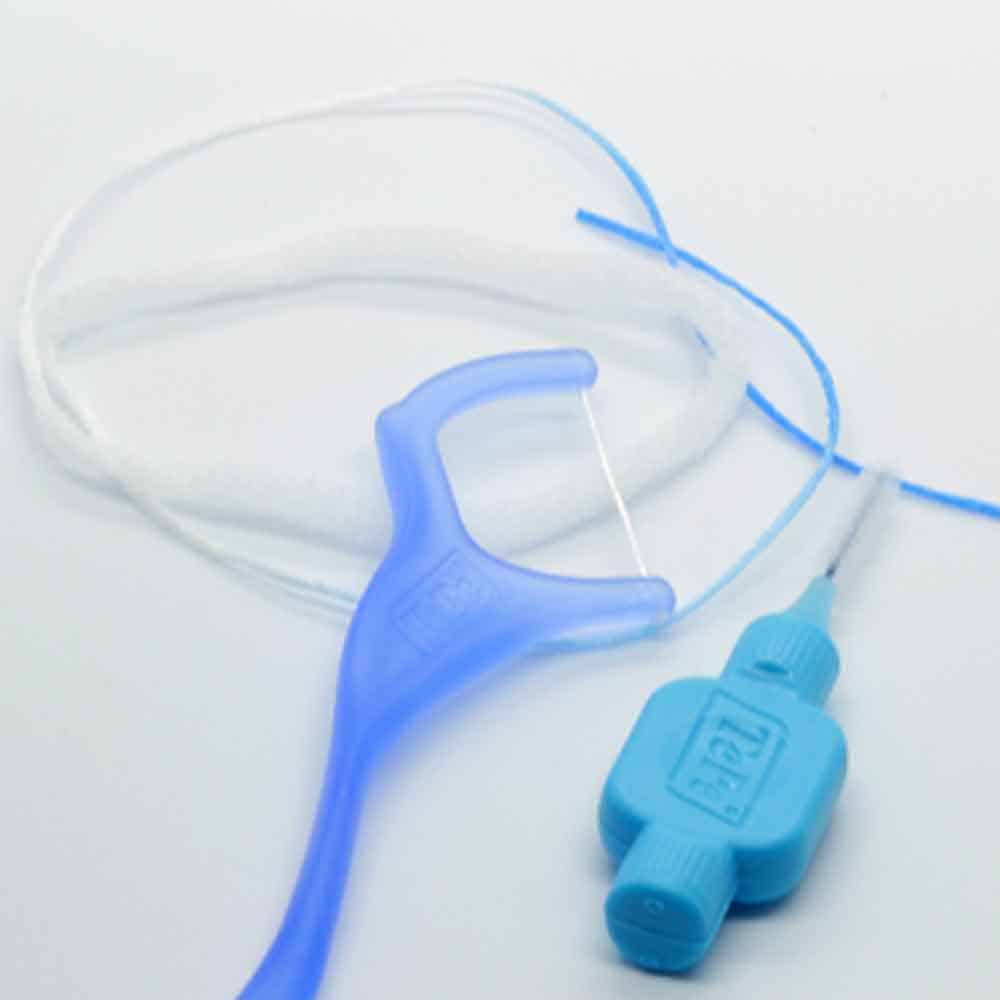
Alternative toothpastes
Toothpastes can pose a number of challenges to people with disabilities.
People with mental impairments or learning disabilities sometimes will not tolerate a strong tasting toothpaste. Unflavoured toothpastes are available, and I would recommend you visit our page all about non-mint toothpastes.
Foaming toothpaste can also pose a problem. Some people do not like the sensation. Foaming toothpastes are also a challenge for people who have difficulties swallowing.
SLS sodium lauryl sulphate (SLS) is the most common toothpaste ingredient, and is generally considered to be safe.
But SLS can be irritating for those with dry mouths. An SLS free and non-foaming toothpastes can be more comfortable, especially for people whose ability to swallow is reduced.
There are many high street brands that offer SLS free toothpastes.
On the pages I have linked you can also find tables to be able to find a non-mint SLS free toothpaste, should it be required.
Prescription toothpastes have a higher fluoride content than regular toothpastes. They are only available on prescription from a medical professional.
They help to reduce risk of dental decay. This is particularly helpful to avoid the need for treatment in the future.
Chlorhexidine gel is an alternative to regular toothpaste in the short term. It is antibacterial.
Looking after dentures
Dentures should be left out overnight. Use a soft brush, without toothpaste to clean the surface. Regular use of a denture cleanser will also help keep them fresh.
Dentures can feel loose in the mouth. This can be because of changes in muscle tone, or because the dentures are not fitting well. A short term option is to use a denture fixative to help them stick in the mouth.
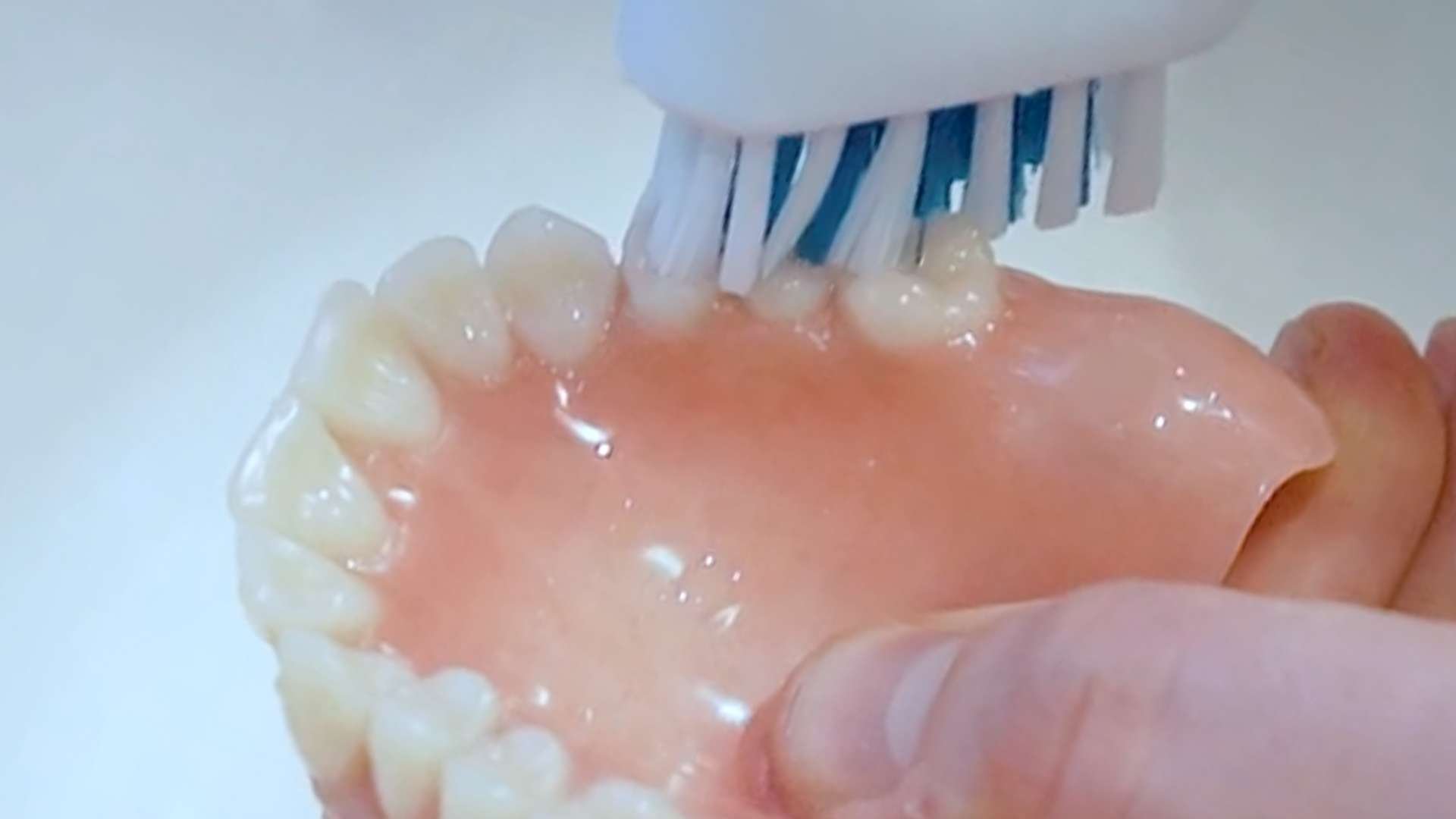
Dry mouth advice
Medications can cause dry mouth. Some people are also predisposed to a dry mouth e.g. if breathing through the mouth rather than the nose.
Having a dry mouth increases the risk of tooth decay and gum disease. This is because saliva has an important role in protecting teeth and gums.
Having a dry mouth can also feel uncomfortable. It can also make it difficult to clean the mouth e.g. brushing.
Some tips for managing a dry mouth
- Keep hydrated with frequent sips of water.
- Chew sugar free chewing gum.
- Use water based mouth moisturising gels or sprays (such as Biotene Dry Mouth Moisturizing Gel - available on Amazon)
- Try an SLS free toothpaste to reduce irritation.
Tips for carers
Brushing other people’s teeth presents it’s own challenges. There are useful resources available to help you do this, which I list later on.
Encourage the person you are assisting to do as much as they are capable of themselves. Your role may be to prompt and assist where necessary.
However, you may also need to do the brushing yourself. Some helpful tips for looking after someone else’s teeth:
If they bite on the toothbrush: Allow the person to continue biting their toothbrush whilst the other teeth are cleaned with another toothbrush. A silicone brush may be more comfortable for them to bite down on.
If caring for someone with a strong tongue thrust: try wrapping flannel or gauze around the forefinger. Use this to gently move the tongue.
If the person you are caring for struggles with gagging or retching on brushing try to start brushing from the back teeth and move forward. A smaller toothbrush can reduce this too.
The most important thing is patience and perseverance. Slowly introduce new techniques and get the person you are caring for used to having something in their mouths.
For people who are unable to tolerate normal cleaning, even a sweep with a clean sponge can help.
Try to avoid using foam sticks for cleaning. This is because there are cases of them becoming detached, which is a choking hazard. In fact, following an MHRA Medical Device Alert the use of these have been banned in Wales, and in some English NHS trusts.
Technology and apps to help cleaning
Videos and apps are available that can help prepare someone you care for. They can outline what needs to happen when cleaning. Some are also good for distraction during the cleaning process.
- Westminster Tooth Fairy - Whether you’re a child, parent, carer or teacher, you can find out just how easy it is for children to have healthy teeth with Westminster’s Tale of Triumph over Terrible Teeth.
- Easy Health provides accessible information for people with disabilities, and their carers. They have dental specific information here.
- The Brush DJ app plays music to encourage brushing for the correct amount of time.
- Magnus Cards have an app designed to help users learn skills. The digital cards combine step by step instructions and visual cues to make experiences easier to navigate. They have partnered with Colgate to provide information about caring for your teeth.
- Sesame Street has an interactive video teaching about tooth brushing.
- Teeth: The Musical is an animated musical about oral hygiene. It was made with learning disabled students and designed as an entertaining film with tunes.
For further information about caring for somebody else’s teeth, you could read Mouth Care Matters - A programme from Health Education England. Their resources include lots of practical tips for people who care for others. They also have an e-learning programme.
Getting dental treatment if you have disabilities
People with disabilities can also have problems accessing a dentist.
There can be physical barriers to a dental centre. People with learning disabilities may become anxious at the thought of going to the dentist. And people with severe medical problems may need extra precautions or care.
Special Care Dentistry is a type of dentistry. The dentists undergo extra training to be able to provide the best possible care. The staff have specialised experience, qualifications and expertise. The practice itself will have additional equipment such as hoists or a wheelchair tipper to support people with disabilities or impairments.
These dentists are often able to provide sedation to reduce the anxiety associated with dental care.
Special care dentists can also provide domiciliary care, where they are able to provide care away from their dental practice. They can do some treatments in people’s homes.
There is information about how to find a specialist dentist on the British Society for Disability and Oral Health website. You can also contact the British Oral Health Foundation Dental Helpline via email at [email protected] or telephone on 01788 539780.
Take home messages
Much of the basic information about dental care for people with disabilities is the same as for non-disabled people.
Sadly, people with disabilities are at increased risk of dental problems such as dental decay and gum disease. Because of this, preventative steps are even more important.
It is possible to find and use special toothbrushes for disabled individuals, or those with limited mobility. Likewise, there is a wide range of toothpastes which may be better tolerated than those already used.
Your dentist can help by providing additional fluoride treatments.
There are a wealth of resources available for people who care for others. These should help carers brush the teeth of the people they support.



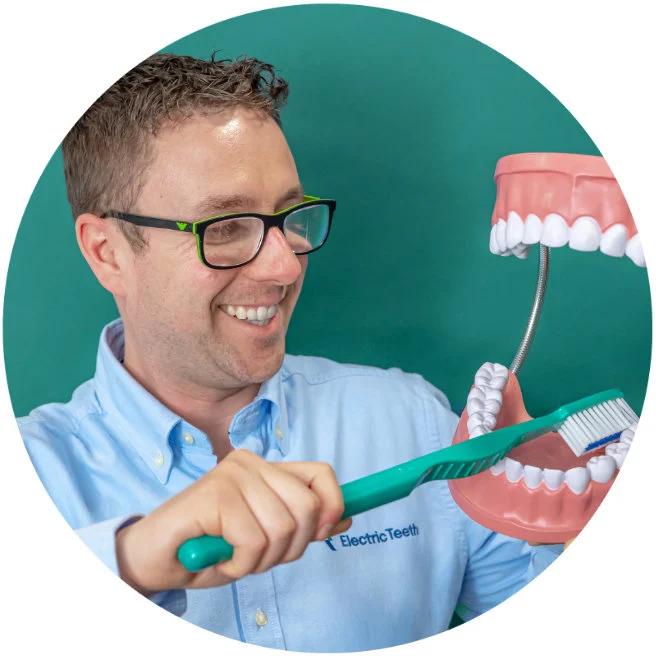

My brother has sever cerebral paulsy he’s early 30s and dental care is a real issue. He doesn’t mind brushing so much but do you have recommendations for a toothpaste that is safe to swallow? He is not physically capable of rinsing or spitting out toothpaste nor is he mentally capable of understanding instructions. His teeth are becoming quite bad because it can be hard to brush his teeth for more than 5-10 seconds before he gets upset
It's generally advised to never swallow toothpaste if it can be helped.
In your brothers instance a good place to start might be brushing without toothpaste.
Toothpaste has benefits, such as a fresh taste and protection to the teeth (flouride) but the physical act of brushing to break up the bacteria is most important.
If you do want to use toothpaste, a fluoride based toothpaste is generally considered the best as it helps protect the teeth. A small amount being swallowed is no great harm. However it is more of an issue if your brother uses multiple drops of paste each time he brushes. So manybe swallowing lots of paste each use.
A toothpaste with nano-hydroxiapetite rather than fluoride might be considered better here (differences of opinion exist), but these pastes as more expensive and a little harder to come by.
Thank you so much for sharing this valuable and necessary information and for being in tune with the challenges that are faced by disabled people and carers alike. I was so impressed with this website! Well done!! It was great to get input on so many of the various challenges faced, and some advice on products too. I was particularly pleased that you included products that are 'better than not cleaning at all' as many professionals seem to shy away from making recommendations in that area.
Thanks again. Jen.
Finally. Someone who understands oral sensitivity. You made me cry.